Bonus post today, since it’s the first of May, and it’s a cloudy, drizzly, damp and not very bright day in Umbria today - and in Italy a national holiday so I can’t do the shopping - I thought it would be fun to take a look at the old English custom of “going Maying,” a favourite subject for those old romantics, the Pre-Raphaelite painters.
And we could take a little look at the old May Day, and what it still means to many English people and traditional Catholics, through some art and the music of Maddy Prior.
Queen of the May
The Marian title "Queen of May" exists in several countries. In English speaking countries we have:
Hail Virgin, dearest Mary! Our lovely Queen of May! O spotless, blessed Lady, Our lovely Queen of May. Your children, humbly bending, Surround your shrine...
This button will take you to my studio blog, Hilary White; Sacred Art, where you can see a gallery showing my progress learning how to paint in the traditional Byzantine and Italian Gothic styles. It includes a link to my PayPal where you can make a donation or set up a monthly support to become a patron. Many thanks to those who have already contributed. At the moment, patronages, one-off donations and occasional sales of paintings are my sole source of income. If you’ve enjoyed this site, I hope you’ll consider donating so I can keep doing it.
And all over the Catholic world we celebrate with May Crownings, May Day parades and May Pole dancing. (Yes, people still do this. I’ve done it. It’s not hard. You could try it too.)

Commies and Neo-pagan LARPers: Modernia gets it wrong… again.
The first of May across Europe and the New World, has been hijacked by popular Marxism, turning it variously into “Labour Day,” or “International Workers Day,” and in every case it seems a miserable, dour affair. It still involves parades, but it seems more like a display of power by the forces of Sauron. Because if we could sum up what Modernia is about, I think “anti-fun” is probably the most concise.
This is what the French do today, because apparently they just can’t take a single day off being French:
And let’s just leave alone St. Joseph the Worker. Even Wikipedia knows that the feast of St. Joseph the Worker was instituted for May 1st by Pius XII “as a counterpoint to the communist International Workers' Day celebrations on May Day”. But, with respect to the saintly pope, maybe a better idea would have been to promote more vigorous observance and revival of the ancient Marian celebrations of May Day, in all their multitude of cultural expressions. It’s certainly no accident that the commies put their big holiday, like a heap of badly made bricks, on top of this medieval feast of the Mother of God. Why not snatch it back from their blood-stained claw?
About the “neo-pagans” who imagine they’re “reviving an ancient Celtic festival of Beltane,” the less said the better, for the sake of decency. I’ve seen the pics, and they’re out there if you want to know. But I also know that ancient pre-Christian Celtic societies were as rigidly rules-bound and socially stratified as anything the Christian Middle Ages knew, and I’m morally certain there weren’t too many open-air orgies in ancient Britain.
Anyway…

Going a Maying
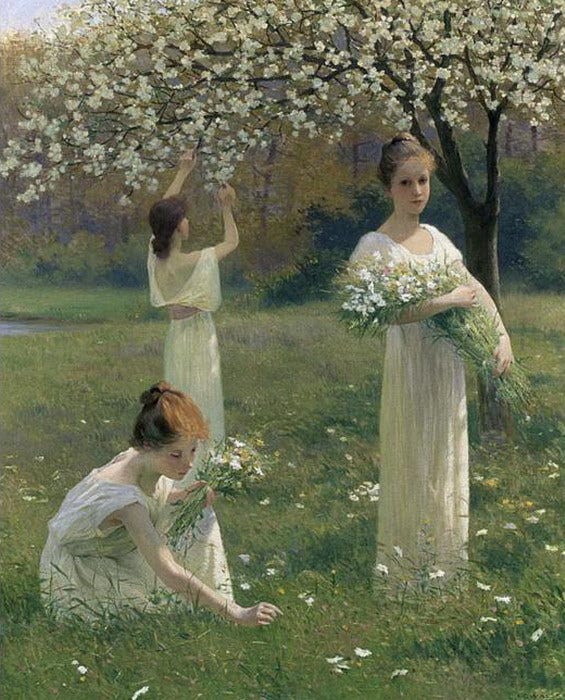
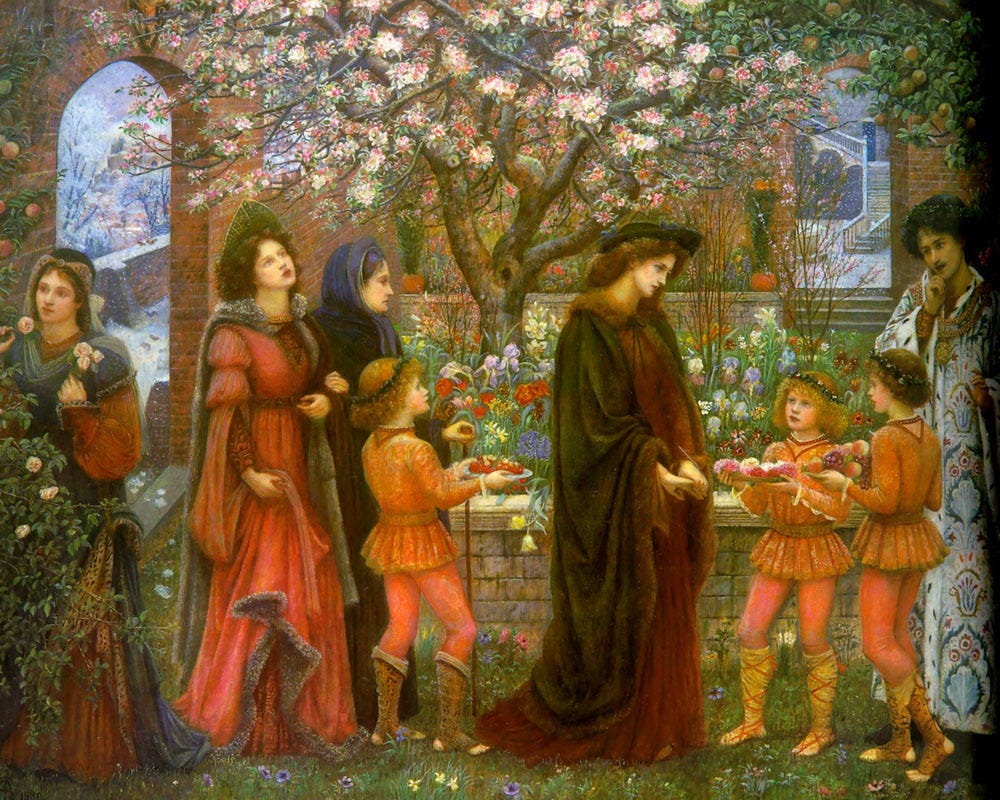
What exactly is “Maying”? The gist seems to be that you just go outside, to the local woodsy bits near your home village (a park will do) and enjoy the flowers and new leaves. Maybe take a picnic. And you can clip off some of the boughs of flowering hawthorn and wildflowers to bring home and stick in a jar. Maybe do this while wearing a diaphanous white gown, or perhaps riding a palfrey if you can find one. Bonus points for bringing your own lute players.
The first place I ever heard about Maying was from C. S. Lewis. The two English children, Eustace Scrubb and Jill Pole, are told by the Narnians the sad story of the death of their queen, the star’s daughter and wife of King Caspian X the seafarer, who was killed by the Green Witch while out Maying.
“About ten years ago, when Rilian, the son of Caspian, was a very young knight, he rode with the Queen his mother on a May morning in the north parts of Narnia. They had many squires and ladies with them and all wore garlands of fresh leaves on their heads, and their horns at their sides; but they had no hounds with them for thy were maying, not hunting. In the warm part of the day they came to a pleasant glade where a fountain flowed freshly out of the earth, and there they dismounted and ate and drank and were merry…”
“The sun came back over the Forest, bringing the scent of May. All the streams of the Forest were tinkling happily to find themselves their own pretty shape again and the little pools lay dreaming of the life they had seen and the things they had done.” ~A.A.Milne
This quick little explanation comes from the current page of the city of Birmingham that, being Modernian, is careful to excise any mention of the Blessed Virgin:
'Going a Maying' took place on May Day eve, when young people went out into the woods to collect flowering branches, bringing back the may into their homes at sunrise. The May tree was believed to have special powers and bringing its blossom inside thought to be unlucky at any other time than on May Day. The hawthorn is the traditional May tree, but other British trees in blossom at this time include sycamore, rowan or mountain ash.
The custom of children's flower garlands was popular in the 1800s and evolved from the bringing in the may custom usually performed by young adults. After making their garlands, children would go from house to house, singing songs and collecting money. It was also customary for plants to be attached to doors whose names rhymed with the assumed character of the person who lived within. Holly on your door would mean you were thought to be jolly, whereas briar would indicate a liar!
Corinna's going a Maying
By Robert Herrick
Get up, get up for shame, the blooming Morn
Upon her wings presents the god unshorn.
See how Aurora throws her fair
Fresh-quilted colours through the air;
Get up, sweet slug-a-bed, and see
The dew bespangling herb and tree.
Each flower has wept, and bow'd toward the east,
Above an hour since; yet you not drest,
Nay! not so much as out of bed?
When all the birds have matins said,
And sung their thankful hymns, 'tis sin,
Nay, profanation, to keep in,
Whenas a thousand virgins on this day
Spring, sooner than the lark, to fetch in May.
Rise; and put on your foliage, and be seen
To come forth, like the spring-time, fresh and green;
And sweet as Flora. Take no care
For jewels for your gown, or hair;
Fear not, the leaves will strew
Gems in abundance upon you;
Besides, the childhood of the day has kept,
Against you come, some orient pearls unwept;
Come and receive them while the light
Hangs on the dew-locks of the night;
And Titan on the eastern hill
Retires himself, or else stands still
Till you come forth. Wash, dress, be brief in praying;
Few beads are best when once we go a-Maying.
Come, my Corinna, come; and, coming, mark
How each field turns a street, each street a park
Made green and trimm'd with trees; see how
Devotion gives each house a bough
Or branch; each porch, each door ere this
An ark, a tabernacle is,
Made up of white-thorn, neatly interwove;
As if here were those cooler shades of love.
Can such delights be in the street
And open fields and we not see't?
Come, we'll abroad; and let's obey
The proclamation made for May,
And sin no more, as we have done, by staying;
But my Corinna, come, let's go a-Maying.
There's not a budding boy, or girl, this day,
But is got up, and gone to bring in May.
A deal of youth, ere this, is come
Back, and with white-thorn laden, home.
Some have despatch'd their cakes and cream,
Before that we have left to dream;
And some have wept, and woo'd, and plighted troth,
And chose their priest, ere we can cast off sloth;
Many a green-gown has been given;
Many a kiss, both odd and even;
Many a glance too has been sent
From out the eye, love's firmament;
Many a jest told of the keys betraying
This night, and locks pick'd, yet we're not a-Maying.
Come, let us go, while we are in our prime;
And take the harmless folly of the time.
We shall grow old apace, and die
Before we know our liberty.
Our life is short, and our days run
As fast away as does the sun;
And as a vapour, or a drop of rain,
Once lost, can ne'er be found again,
So when or you or I are made
A fable, song, or fleeting shade,
All love, all liking, all delight
Lies drown'd with us in endless night.
Then while time serves, and we are but decaying,
Come, my Corinna, come, let's go a-Maying.








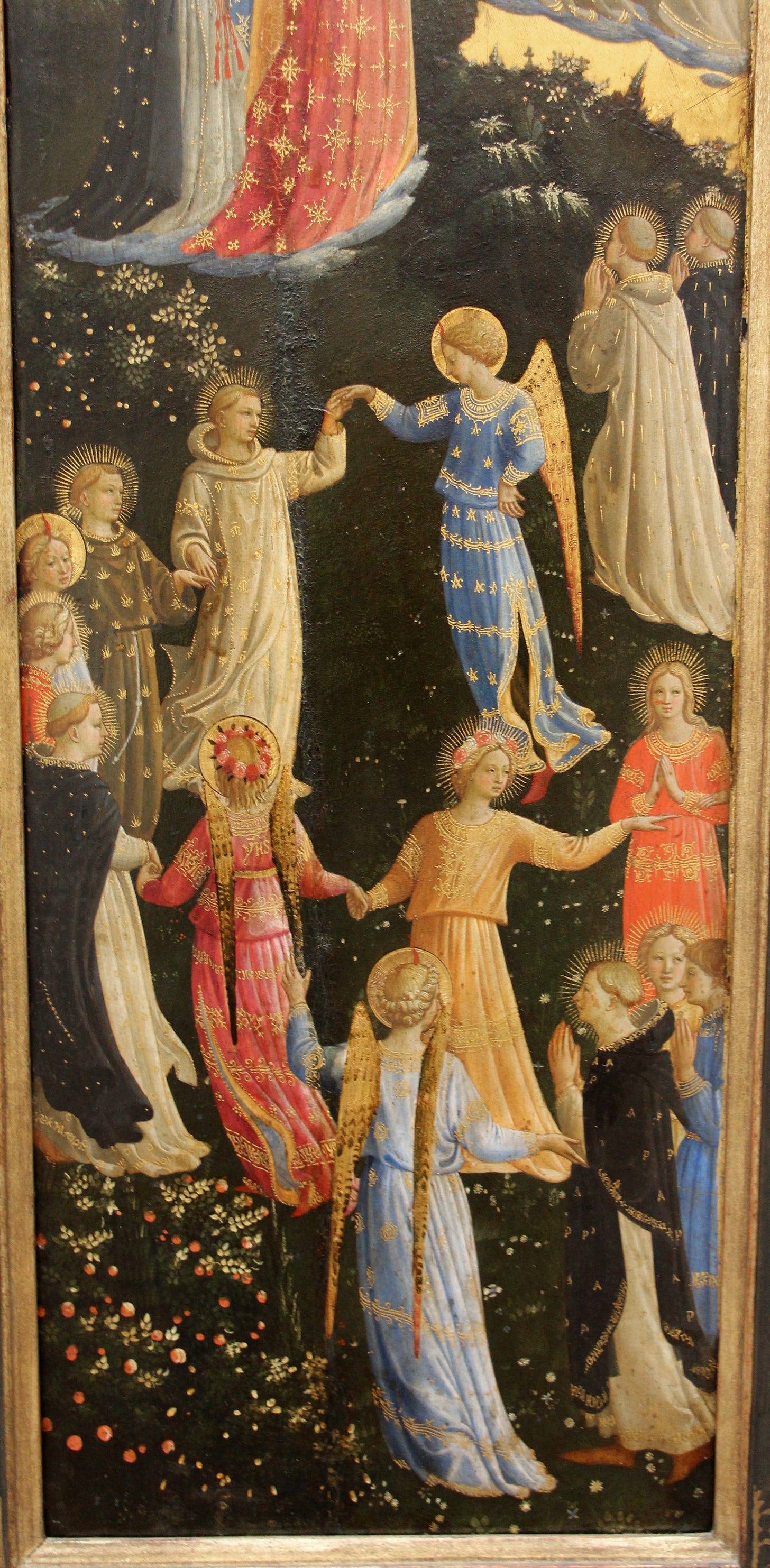
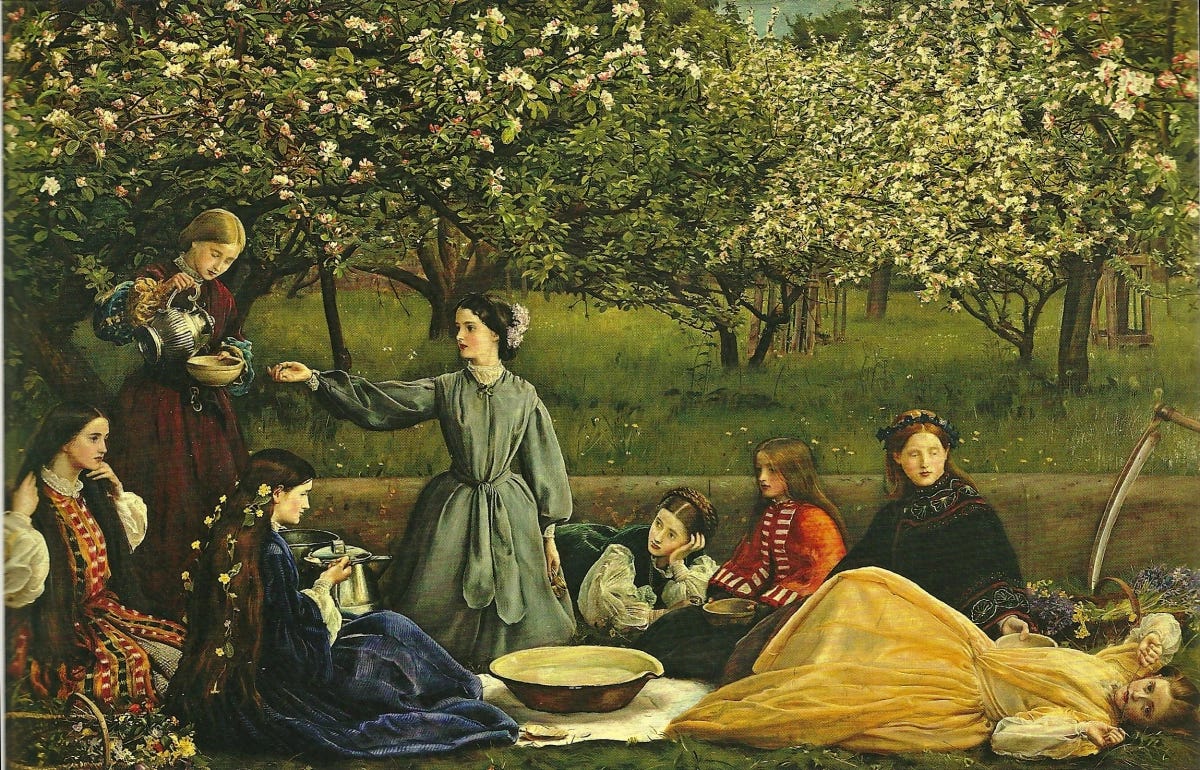

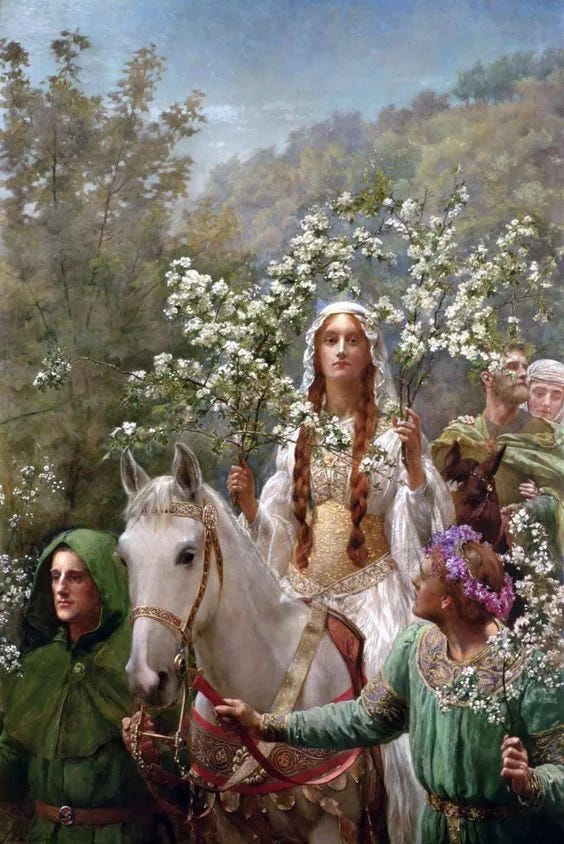
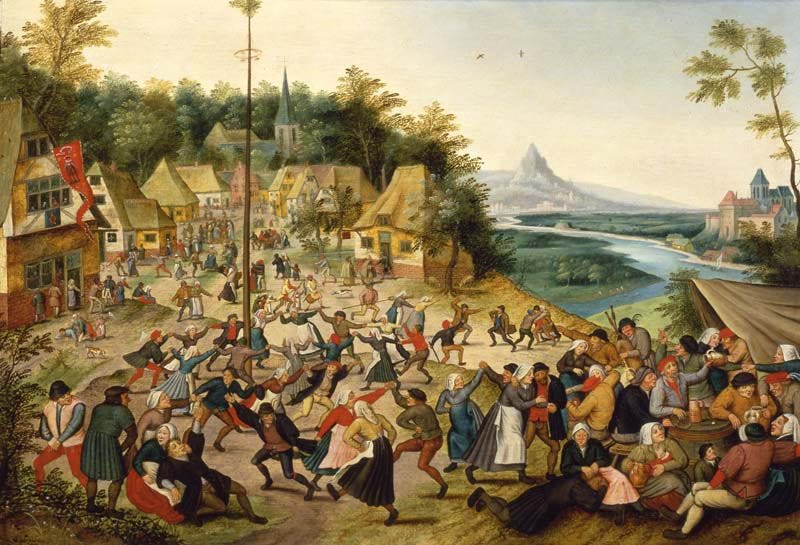

Many thanks for this on a rainy, cold day in Midwest America! Too wretched even, to go outdoors and fetch, or even enjoy, our floods of daffodils. Do you know, by any chance, an old ballad, parts of which I have forgotten; probably 19th century?
"Awake, awake my pretty, pretty maid/Out of your drowsy dream
And step into your. dairy below/ and fetch me a bowl of cream.
A branch of May I bring to you/ 'Tis neither fine nor grand
'Tis nothing but a sprout/But is well budded out by the work of our good Lord's hand etc"
That may be wrong, but it was a pretty little May song.
This is great - "forces of Sauron" 😆